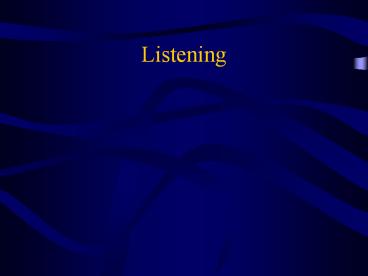Listening - PowerPoint PPT Presentation
Title:
Listening
Description:
Listening Why Do We Listen? To understand and retain information To evaluate the quality of messages To build and maintain relationships To help others But it s not ... – PowerPoint PPT presentation
Number of Views:46
Avg rating:3.0/5.0
Title: Listening
1
Listening
2
Why Do We Listen?
- To understand and retain information
- To evaluate the quality of messages
- To build and maintain relationships
- To help others
3
But its not as easy as we might think
- Hearing problems
- Information overload
- Personal concerns
- Rapid thought
- Noise
4
Recognize anyone?
- The pseudolistener
- The stage hog
- The selective listener
- The embellisher (filling in the gaps)
- The insulated listener
- The defensive listener
- The ambusher
5
Listening Components
- Hearing
- Attending
- Understanding
Remembering
- Responding
6
Types of Listening Responses
(From Most Reflective/Least Evaluative to Least
Reflective/Most Evaluative)
7
Silent Listening
Staying attentive and nonverbally responsive
without offering any verbal feedback.
Attending Skills The S.O.L.E.R. Method S
Square up and bodily face the person O Open
your posture and maintain it L Lean forward as
appropriate E Eye contact R Relax, smile and
keep an open expression
8
Questioning
- The listener asks the speaker for additional
information - To clarify meanings
- To learn about others thoughts, feelings, and
wants - To encourage elaboration
- To encourage discovery
- To gather more facts and details
- To trap the speaker
- To make a statement
- To further a hidden agenda
- To seek correct answers
- To imply an unchecked assumption
9
A little more about Questioning
Open-Ended vs. Closed Questions Open-ended
questions are more facilitative than closed-ended
questions. Closed questions give you more
definitive answers. The Why Question Questions
beginning with Why can be problematic. They
tend to put the other person on the defensive.
They also put us in a one-up position, and the
other person in a one-down position. How or
What may be better alternatives.
10
Paraphrasing
- Feedback that restates, in your own words, the
message - you thought the speaker sent.
- Use your own words Dont be a parrot!
- Give specific examples to clarify abstract
statements - Look for the big picture/main idea, and reflect
that back - Some helpful beginnings
- What I hear you saying
- It sounds like
- Youre feeling
11
Why paraphrase?
- Allows you to see if your understanding is
correct - May draw out more information from the speaker
- Takes the heat out of intense discussions
12
Empathizing
- Conveys identification with a speakers
perceptions and emotions - An empathetic attitude is more important than a
specific response - Involves putting yourself in the other persons
shoes - Responses are feeling-focused
- Responses can be in the form of questions,
paraphrases, or just
something small like Oh, no!
Really? Wow! Ouch!
13
Supporting
Reveals the listeners solidarity with the
speakers situation
Agreement Praise Offers to
Help Reassurance Diversion But be
careful Be sincere Evaluate how helpful a
supportive response will be Focus on the
present concern, rather than the future outcome
14
Analyzing
Offering an interpretation of the speakers
message Whats really going on
is Youre just afraid of Maybe its
because Tips for making a helpful
analyzing response -- Leave yourself wiggle
room Keep it tentative -- Make sure its
wanted -- Be honest with yourself about your
motives
15
Advising
- Offering suggestions about how the speaker
should deal with a problem - One of our most common listening responses
- Can be very helpful when it is wanted
- Can be very annoying when it is not wanted
- It can be very helpful when it is relevant,
timely, logical, and practical. - Make sure it is wanted Do you want some
advice? - Resist the temptation Dont give it if its
not wanted
16
Evaluating
Appraising the senders thoughts or behaviors in
some way Again, make sure that the evaluation
is wanted! Constructive criticism vs. Insults
17
Tips to Help You Stay in the Listening Mode
- Concentrate on the content of what is being said.
Dont be turned-off by poor delivery. - Dont enter into an argument or make a judgment.
- Listen for concepts and main ideas.
- Be flexible in how you summarize what the speaker
is saying. - Show the speaker that you are interested, and be
active in your listening behavior. - Overcome distractions
- Listen with your mind. Thought is faster than
speech.

